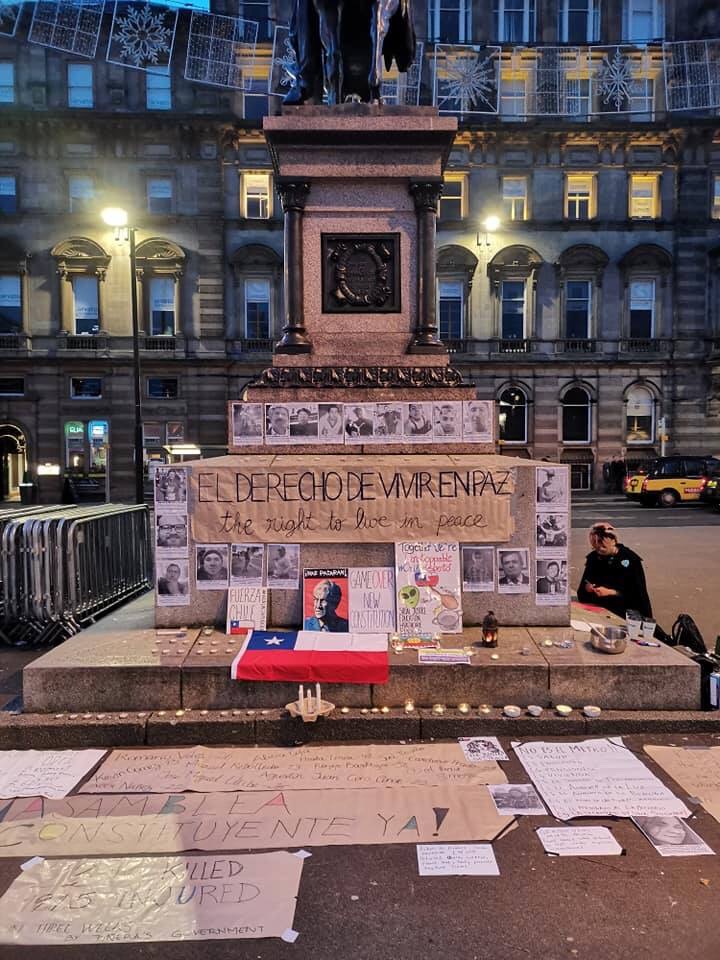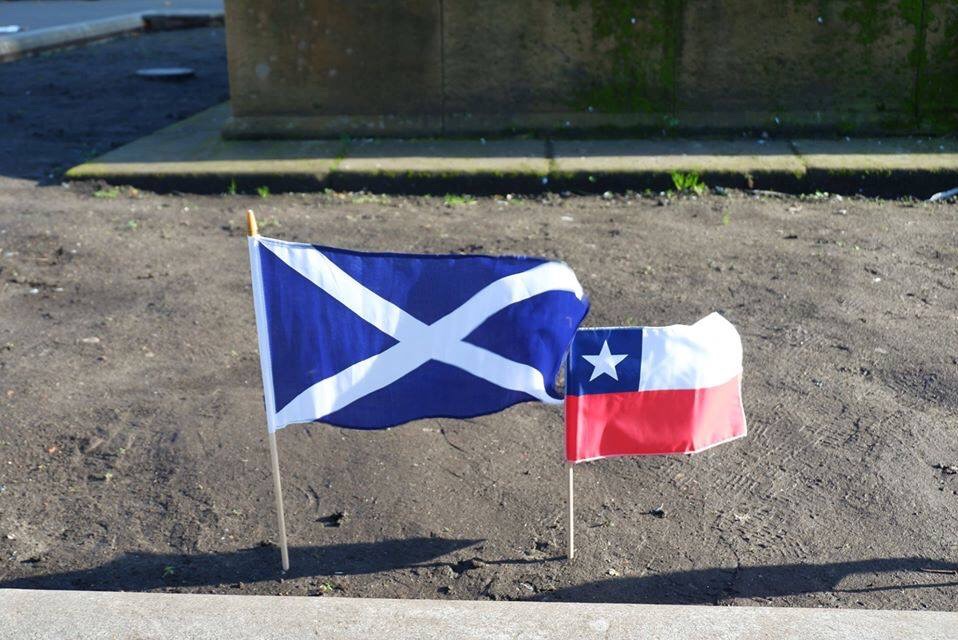[Written by Siam Hatzaw]
[Image Credits: Anita Verina]
Content Warning: Contains discussion of state and police enforced violence, military dictatorship, and several human rights violations including sexual violence.
Over the last two months, the world has watched as images flooded the news of a country in flames. Chile has been shaken by ongoing protests, beginning in the capital of Santiago and expanding into a nationwide uprising. This wave was sparked by a hike in Santiago’s Metro fare, which rose by 30 pesos for the Metro and Metrotrén. Although this increase may seem insignificant, contextualising the costs reveals how the fares reflect the layers of inequality strewn throughout the country.
Santiago is a sprawling city with the largest Metro system in South America, carrying an estimated 3 million passengers per day. The capital charges the second highest transit fares in Latin America meaning that, on average, transport costs make up the equivalent of 13.78% of a minimum salary. In a country gripped by economic disparity (where 1% of the population controls 26.5% of the country’s wealth and 50% of low-income households access only 2.1%), it is clear to see why this fare hike became the last straw – and it was students who led the charge.
On 7 October, students organised the fare-dodging campaign ‘¡Evade!’, opening barriers and letting the public in for free. The campaign quickly escalated, leading to clashes between protesters and police which resulted in 133 arrests and damage to the Metro system estimated at 500 million pesos (£468,848). On 18 October, President Sebastián Piñera declared a state of emergency. In an effort to subdue the protests and exert control over the public, a curfew was instated on 16 regions of Chile between 10pm and 7am, during which it was illegal for any civilian to be out on the streets.
Despite Piñera’s attempts, footage began to emerge of Chileans who refused to be silenced. On 22 October, a video went viral encapsulating the spirit of the protests. We watch as a lone voice rings out through the streets of Santiago – Ayleen Jovita Romero sings “El derecho de vivir en paz” (“The right to live in peace”) in soprano, as a peaceful demonstration against the mandated curfew. Neighbours joined in with their instruments, including a violinist, an accordionist, and another singer. As the final notes draw to a close, Romero’s act of defiance is met with resounding applause from the apartment blocks lining the near-empty streets below. The video captures the unified resilience of the Chileans, highlighted by Romero’s choice of song. “El derecho de vivir en paz” was originally composed by folk singer Victor Jara, who was murdered in the days following the military coup of 1973. Herein lies the heart of the country’s uprising. The protests evolved from a movement against seeds of inequality sewn decades ago during the dictatorship of Augusto Pinochet. To better understand the plight of Chileans in the present, we must look back to a pivotal moment in the country’s history.
Salvador Allende, of the coalition Unidad Popular (“Popular Unity”), was democratically elected by Congress in 1970. While initially successful, opposition from landowners, right-wing groups, and foreign governments ultimately led to industrial strikes and shortages of goods imported from abroad. The resulting economic collapse led to increasing civil tension. On 11 September 1973, the military raised a coup against Allende’s government. Led by Pinochet, the military bombed the Presidential Palace, forcing Allende to give his famous farewell speech with the ever-resonant words: “Workers of my country, I have faith in Chile and its destiny”. What followed was a dictatorship regime lasting 17 years until 11 March 1990. Pinochet’s junta enacted atrocious human rights abuses, persecution of dissidents, and unprecedented levels of cruelty towards its population. Over 3000 died or went missing, tens of thousands of prisoners were tortured, and an estimated 200,000 Chileans exiled.
The devastation left in the wake of the dictatorship is embedded in the country’s collective memory, inflicted upon the most vulnerable groups and fanning the flames of today’s uprising. Although this began on the surface as a student-led campaign against transit fares, it quickly became clear that these young protesters stand on the shoulders of generations fighting back against oppression. Before long, over a million stood together marching in the streets on 25 October to demand Piñera’s resignation. Voices rang out chanting “It’s not 30 pesos, it’s 30 years”, in reference to the 30 years of democracy since the end of Pinochet’s reign, making one thing unmistakably clear: this goes far beyond Metro fares. This is a demand for change from the roots, an upheaval of an unjust system 30 years in the making. Chileans gathered from all walks of life, including “social movements, Indigenous people, women, retired people, unions, students and more”. The inclusion of Chile’s Indigenous groups is integral, as the Mapuche (who make up 10% of the population) have declared their demand for an independent government due to lack of representation in the Chilean congress. Three days after the march, Piñera responded by sacking eight members of his cabinet, telling the public in a televised speech: “Chile has changed, and the government must change with it to confront these new challenges.” But the reality of the response tells a different story.

Piñera militarised police forces who have exercised shocking levels of violence, leaving 26 people dead, thousands injured, and 15,000 detained as of 26 November. Reports have included the use of tear gas, water cannons, non-lethal ammunition, shotgun pellets, and 1400 of those injured sustaining gunshot wounds. The use of shotgun pellets is particularly disturbing as they scatter “indiscriminately with the potential to harm anyone in their path”, resulting in over 220 eye injuries with 16 people losing their sight. Chile’s National Human Rights Institute (INDH) is currently compiling a report on several human rights violations including “442 criminal complaints on behalf of victims with prosecutors, regarding injuries, cruel treatment, torture, rape, killings, and attempted killings allegedly committed by security forces.”
Overall, the demonstrations have resulted in devastating consequences, with a recent statement from the Health Minister revealing that the “country’s emergency services treated 11,564 people injured”. Mounting allegations of human rights abuses have forced Human Rights Watch and Amnesty International to call for an immediate overhaul of police protocols. Journalists attempting to uncover the atrocities have been targeted – on 21 November, photojournalist Albertina Martínez Burgos was found beaten and stabbed to death in her own home. Burgos had been documenting the violence against protesters, particularly against women, but her most recent photographs were reportedly stolen. Burgos’ focus on revealing the violence against women in particular was crucial – INDH stated that “the police appear to be more likely to force women and girls to strip than men” and 74 cases of sexual abuse have been compiled. Over the past five weeks, these violations serve as a haunting reminder of the cruelty enforced under Pinochet’s dictatorship – disturbing comparisons can be drawn between the military forces of past and present. Chile has witnessed the shockingly small, sudden step it takes to revert back into its own history.
As the situation escalated, a plebiscite was offered on 15 November for Chileans to decide on reforming the constitution. Chile’s current constitution was formed in 1980, during Pinochet’s reign, and was seen as “prioritizing a market-driven economy but failing to adequately guarantee healthcare, education and pensions”. Chileans will decide in April 2020 whether they want a new constitution marking “the first time in the nation’s history that all citizens will be given a voice”. This is a recognisable step in the right direction, but people are still hesitant to hope. Questions now arise over who will be making the reforms, what they will include, and whether the new constitution can truly break away from the legacy of the dictatorship.
Chileans both within the country and abroad have been gathering in cabildos – grassroots gatherings to discuss the next steps to be taken. Here in Glasgow, an active community of Chileans has formed to organise events which raise awareness of the situation. Chilean solidarity activists held candlelight vigils to show their respects to those who have lost their lives fighting for equality, and to extend support to those still fighting. The group also organised their own cabildo in Glasgow Autonomous Space as an opportunity to share a meal, discuss how they can help, and connect with each other as their country approaches a watershed moment in history. On 1 December, they collaborated with Friends of the Earth Scotland, Scottish Trades Union Congress, Divest Strathclyde, and Fossil Free Glasgow to host a day of talks and activities. The ‘Cabildo Ecologico’ shone a spotlight on the reasons why the UN climate conference COP25 was moved to Madrid, which is believed to be so that the international community wouldn’t witness the ongoing repression. The event also brought attention to other protest movements around the globe, with participants from Catalonia and Lebanon, as well as hosting Sarah Glynn from Solidarity with Kurdistan as one of the main speakers.
The event included a screening of Nae Pasaran – a 2018 documentary exploring an unexpected link between Glasgow and Chile. The film depicts the moving story of how a group of Scottish factory workers responded to the atrocities of Pinochet’s regime filtering in from the news. The group decided to stand up to the dictatorship by refusing to work on Chilean Air Force parts; through boycotting repairs, they deprived the dictatorship of much of their air power. This act of bravery had a ripple effect, with uncovered evidence suggesting that their actions contributed to the release of seven high-profile Chilean prisoners, thus saving their lives. Nae Pasaran is all the evidence we need to show that displays of solidarity have a remarkable effect. Despite the sense of helplessness we may feel when bombarded with headlines and images from the chain of protests around the world, wherever we are, solidarity matters. It shows that the world is watching, working, and waiting with bated breath for a new hope.
Special thanks to Alejandro Fernandez and Anai Aude Valdivia for providing an in-depth insight into the situation. You can find more information and get involved with the group here, and find photos from the event here.
Twitter: @ChileClasgow, @ChileEdin
Email: [email protected]

